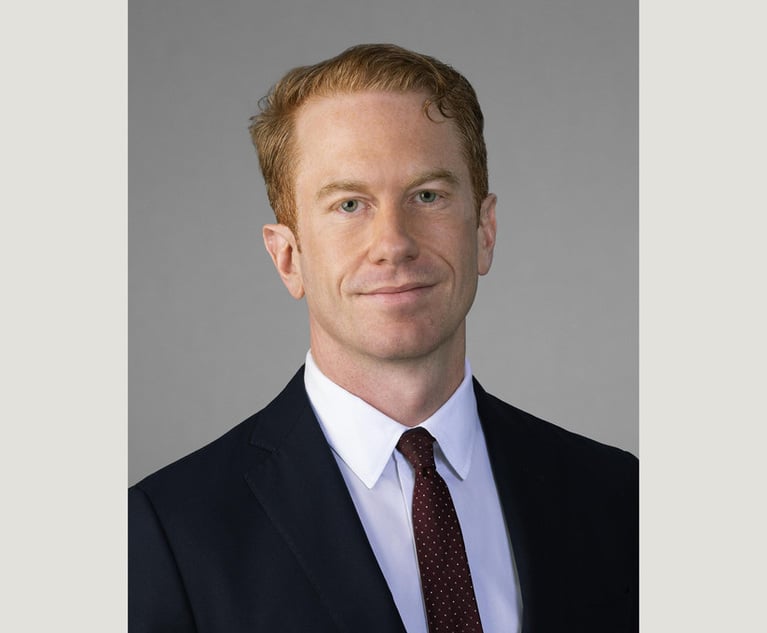Law Firms Are Embracing Change to Satisfy Associates
Firms are pulling out all the stops as we head into 2019, but associate retention remains an issue.
December 28, 2018 at 06:00 AM
4 minute read

The last few years have been tumultuous for the relationship between law firms and their associates.
Marcie Borgal Shunk, president and founder of the Tilt Institute, compares it to the stages of grief.
First, firms went through denial, driven by the sense that they could make everyone fit into their mold without changing a thing, Shunk says. Then came frustration and anger over the fact that millennials weren't so eagerly complying. Firms couldn't figure out why. Next, firms moved into a bargaining phase with their associates.
“They started saying, 'OK, well, what if we give you something and you still give us something?'” she notes. Unfortunately, that didn't go as planned. Firms were offering something like one work-from-home day a month but still expecting 2,000 billable hours a year.
But firms are finally moving toward reluctant acceptance, Borgal Shunk says. At long last, they're actually making concessions.
“[Firms are] acknowledging that some of these changes are here to stay and that they may need to do things differently on a more widespread and permanent basis,” she says.
Although it's not yet pervasive across the industry, Borgal Shunk sees law firms changing in a way that she expects to see more of in the coming year. When they hire, they're now looking for different skill sets and qualifications, the sort that will prepare associates for the future of law.
O'Melveny & Myers, for example, has turned to psychometric tests to hire its newest crop of talent. Firms have also made extensive investments in workplace flexibility programs and expanded parental leave policies to address work-life balance concerns.
And, in 2018, several of the top Am Law firms also gave associates a sizable pay increase, raising first-year salaries to $190,000, with senior talent making $340,000. Factor in mid-year and end-of-year bonuses and top-earning associates now make more than partners at a dozen Am Law 200 firms.
But for all of these positive steps, firms are still staring down the issue of attrition.
“Associate retention continues to be a problem,” Joan Newman, a consultant at Altman Weil, says.
As the path to partnership becomes more and more difficult for associates at larger law firms, they are weighing their options.
“I've seen a lot of associates who want to go in-house for lots of reasons,” Newman says, in addition to those making the jump to other firms. “Maybe their upward mobility isn't what they thought it would be.”
But there's also a generational difference.
“Historically, you took a job and you stayed in that job forever,” Borgal Shunk says. “It's just a different mindset from what most people have today.”
Rather than fighting against this trend, law firms are starting to embrace it.
“You start to see more career development, more engagement, mentoring, and more acknowledgment that this associate may not stay with the firm and become a partner, but we're going to help support them regardless of what they choose to do,” Borgal Shunk says.
Law firms have started investing more and more in new training programs, such as Debevoise & Plimpton's recently announced informal feedback scheme. They've also started building up alumni programs and networking activities to help associates transition to positions outside the firm, with the hope of maintaining those relationships.
“They're acknowledging the changes in the industry and, in essence, bringing in talent in a way that's going to help prepare them for that eventual future,” Borgal Shunk says.
This content has been archived. It is available through our partners, LexisNexis® and Bloomberg Law.
To view this content, please continue to their sites.
Not a Lexis Subscriber?
Subscribe Now
Not a Bloomberg Law Subscriber?
Subscribe Now
NOT FOR REPRINT
© 2025 ALM Global, LLC, All Rights Reserved. Request academic re-use from www.copyright.com. All other uses, submit a request to [email protected]. For more information visit Asset & Logo Licensing.
You Might Like
View All

What Happens When Lateral Partners’ Guaranteed Compensation Ends?

Latham Adds Former Treasury Department Lawyer for Cross-Border Deal Guidance
2 minute read
Wachtell Partner Leaves to Chair Latham's Liability Management Practice
2 minute readTrending Stories
- 1Public Notices/Calendars
- 2Wednesday Newspaper
- 3Decision of the Day: Qui Tam Relators Do Not Plausibly Claim Firm Avoided Tax Obligations Through Visa Applications, Circuit Finds
- 4Judicial Ethics Opinion 24-116
- 5Big Law Firms Sheppard Mullin, Morgan Lewis and Baker Botts Add Partners in Houston
Who Got The Work
J. Brugh Lower of Gibbons has entered an appearance for industrial equipment supplier Devco Corporation in a pending trademark infringement lawsuit. The suit, accusing the defendant of selling knock-off Graco products, was filed Dec. 18 in New Jersey District Court by Rivkin Radler on behalf of Graco Inc. and Graco Minnesota. The case, assigned to U.S. District Judge Zahid N. Quraishi, is 3:24-cv-11294, Graco Inc. et al v. Devco Corporation.
Who Got The Work
Rebecca Maller-Stein and Kent A. Yalowitz of Arnold & Porter Kaye Scholer have entered their appearances for Hanaco Venture Capital and its executives, Lior Prosor and David Frankel, in a pending securities lawsuit. The action, filed on Dec. 24 in New York Southern District Court by Zell, Aron & Co. on behalf of Goldeneye Advisors, accuses the defendants of negligently and fraudulently managing the plaintiff's $1 million investment. The case, assigned to U.S. District Judge Vernon S. Broderick, is 1:24-cv-09918, Goldeneye Advisors, LLC v. Hanaco Venture Capital, Ltd. et al.
Who Got The Work
Attorneys from A&O Shearman has stepped in as defense counsel for Toronto-Dominion Bank and other defendants in a pending securities class action. The suit, filed Dec. 11 in New York Southern District Court by Bleichmar Fonti & Auld, accuses the defendants of concealing the bank's 'pervasive' deficiencies in regards to its compliance with the Bank Secrecy Act and the quality of its anti-money laundering controls. The case, assigned to U.S. District Judge Arun Subramanian, is 1:24-cv-09445, Gonzalez v. The Toronto-Dominion Bank et al.
Who Got The Work
Crown Castle International, a Pennsylvania company providing shared communications infrastructure, has turned to Luke D. Wolf of Gordon Rees Scully Mansukhani to fend off a pending breach-of-contract lawsuit. The court action, filed Nov. 25 in Michigan Eastern District Court by Hooper Hathaway PC on behalf of The Town Residences LLC, accuses Crown Castle of failing to transfer approximately $30,000 in utility payments from T-Mobile in breach of a roof-top lease and assignment agreement. The case, assigned to U.S. District Judge Susan K. Declercq, is 2:24-cv-13131, The Town Residences LLC v. T-Mobile US, Inc. et al.
Who Got The Work
Wilfred P. Coronato and Daniel M. Schwartz of McCarter & English have stepped in as defense counsel to Electrolux Home Products Inc. in a pending product liability lawsuit. The court action, filed Nov. 26 in New York Eastern District Court by Poulos Lopiccolo PC and Nagel Rice LLP on behalf of David Stern, alleges that the defendant's refrigerators’ drawers and shelving repeatedly break and fall apart within months after purchase. The case, assigned to U.S. District Judge Joan M. Azrack, is 2:24-cv-08204, Stern v. Electrolux Home Products, Inc.
Featured Firms
Law Offices of Gary Martin Hays & Associates, P.C.
(470) 294-1674
Law Offices of Mark E. Salomone
(857) 444-6468
Smith & Hassler
(713) 739-1250










